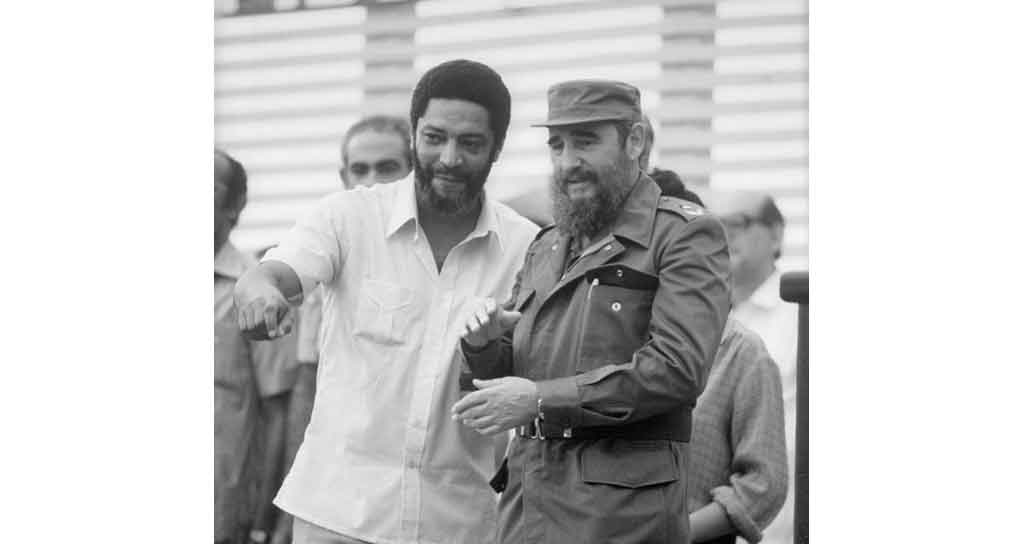By Jorge Luna, Prensa Latina journalist
In Cuba, Mitchell met with President Miguel Díaz-Canel and other authorities, and at almost all official events, Bishop’s example and work, his friendship with the historic leader of the Cuban Revolution, Fidel Castro, and his decision to make relations with Cuba formal just a month after taking office were underscored.
The already-existing close bilateral relations will be strengthened after Mitchell’s visit (April 11 to 14), an occasion on which new cooperation agreements were signed in several fields, some of which had their roots in the Grenadine Revolution (1979-1983).
The official visits made to St. George’s by Fidel Castro in August 1998 and Miguel Díaz-Canel in December 2022 also contributed to the full development of these ties.
In an exclusive interview with Prensa Latina, Grenadian Ambassador to Cuba Glen Noel described Mitchell’s first visit as very timely and significant, and noted that throughout these 45 years, during which there were also difficult times, the friendship between the two peoples endured.
“This visit is a testimony to the strength of those ties, despite the ups and downs after the end of the Grenadian Revolution. At the end of the day, that friendship was resumed and was galvanized as it is today,” he insisted.
(The United States invaded Grenada militarily, through Operation Urgent Fury, on October 25, 1983, after Bishop and several of his ministers were assassinated on March 19, following an internal conspiracy. Last year, that date was officially established as an annual national holiday to remember the victims of that crime).
Noel, a political leader, diplomat and contemporary of Bishop, assured that Mitchell’s presence in Cuba, less than two years after taking office as Prime Minister, is proof of his special interest in continuing to promote these relations.
MAURICE BISHOP’S WORK
He also considered it important that young Grenadians and those of Mitchell’s generation are “studying Bishop’s work, his ideals, his vision, which are perhaps more cemented today than before in the people’s minds,” he stressed.
People are starting to value that period of our history better, he said. You can see where we have come, with sustainable development, and recognize the vision with which we insisted on lifting our people out of poverty at that time.
The people are very aware of the social programs that were developed during the Revolution. This contributed to enriching national pride, which to some extent eroded after the United States invasion.
Our Prime Minister is able to appreciate Bishop’s vision and spirit, Noel pointed out. That, to me, is extremely important.
For someone of my age and generation, it is also encouraging to see someone like our Prime Minister, who was born just a year after the triumph of the Revolution, so aware of Fidel Castro’s role in supporting the independence and integration movement of the Caribbean.
Along with Dickon Mitchell, the Grenadian diplomat identified Prime Ministers Mia Motley, of Barbados, and Ralph Gonsalves, of Saint Vincent and the Grenadines, for example, as current leaders of that movement.
COOPERATION AND SOLIDARITY
As one of the most interesting cooperation agreements, Noel noted “the construction of monuments of our history with the perspective of creating a Park of the Heroes of Granada.”
In that regard, Mitchell also met with artists in Santiago de Cuba, authors of a bronze bust of Bishop that is located in Casa del Caribe (Caribbean House) in that eastern city, to create a similar artwork for Grenada.
The ambassador praised Cuba’s long experience in preserving its history, culture and memory. History is a topic in which our Prime Minister has a lot of interest, who has read about Cuban Apostle José Martí, Liberator Simón Bolívar and Commander Fidel Castro, among others.
In the same regard, Noel stressed the positive impression that the visit to the Havana-based Fidel Castro Ruz Center, an institution that treasures the life and work of the Cuban leader through high-tech exhibitions, had on Mitchell.
He recalled that Cuba has contributed a lot to Grenada’s economic and social life and mentioned, first of all, the construction of his country’s international airport, which was named after Maurice Bishop.
He underscored Cuba’s assistance in education, providing scholarships to young people from Grenada and other countries in the Caribbean and the world, who then return home as professionals.
Noel also praised the presence of several Cuban doctors and health personnel in Grenada, as well as experts in agriculture, sports, culture and other sectors.
In another vein, he stated that Grenada also intends to advance towards the use of medicinal treatments from Cuba’s modern pharmaceutical industry and biotechnological engineering. Therefore, for us, Cuba is one of our most significant bilateral partners, he stressed.
And, it is not just the act of giving, he noted. Cuba has not provided what is left over but rather has shared the little it has with the rest of the world. It has demonstrated the importance of selfless giving and sharing. Cuba has problems, economic and social challenges and, even so, it has not departed from the principles of solidarity, he pointed out.
Relations between Cuba and Grenada can only continue to get stronger and stronger, the ambassador stated.
GRENADA, CUBA AND CARICOM
Regarding the Caribbean Community (CARICOM), Noel said that its leaders have been raising their voices in international organizations to call on the United States to end the inhumane blockade against Cuba and to remove Havana from the list of promoters of terrorism, which we consider cruel and unjust.
The CARICOM members are looking for other ways to strengthen relations and we consider that, just as Cuba provided us with assistance, we also believe that our Caribbean institutions should be open for Cubans to study languages, tourism, business administration and some sports, he said.
jg/arb/jl










